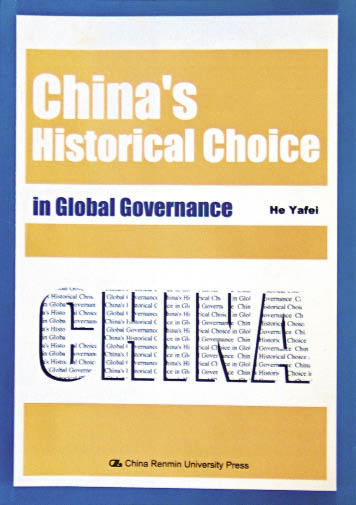Two-way Choice Between China and History
China’s Historical Choice in Global Governance
Price: RMB 198
Author: He Yafei
Paperback, 210 pages
Published by China Renmin University Press

“One evening in August 2009 in Frankfurt, Germany, as the summer heat subsided and breezes rustled the leaves, Sherpas from five G20 countries – the U.S., the U.K., China, France, and Germany – each with their personal retinue, gathered in a nondescript dining room at the German Central Bank for a ‘non-existent dinner.’ Such occurrences are common diplomatic practice.”
“What was under discussion that night? In a nutshell, it was the future of the G20. At that time, we had two summits under our belt with impressive results, and most G20 members felt that the G20 was an ideal platform to discuss and manage world economic affairs. But there was also the G7 for advanced economies, the BRICS for major developing countries and the G8+5 for informal dialogue between developed and developing economies.
“What should be the next step in global governance reform? Which platform would be best suited to the task? These were questions that the G20 members asked themselves and which the five Sherpas intended to address. Because of the sensitivity involved, the major powers among the G20 wished to hold a private discussion.”
China’s Historical Choice in Global Governance, published in 2015, contains an in-depth discussion on the global strategic landscape and the development of international relations after the international financial crisis broke out in 2008.
The author gives in his preface a vivid description of how during this historic event the G20 summit became upgraded to a main platform for global governance. Under the heading, “We finally sat at the main table!” he remarks that the year 2009 marked a turning point in global governance which fundamentally changed the destiny of developing countries, as represented by China.
The book observes the history, current situation, and reform of global governance from multiple perspectives, including politics, economics, finance, culture, new media, non-governmental organizations, and international migration, paying particular attention to the role and development of the G20 mechanism. The author proposes that China grasp the opportunities, meet the challenges, proactively participate and become involved in the global governance system through a constructive leadership role. He holds that only by combining China’s international interests with the common interests of the international community can we realize the Chinese Dream of the great rejuvenation of the Chinese nation.
The book is in two parts: “Global Governance” and “China & Global Governance.” It discusses far-reaching, key topics such as the Chinese Dream, the notion of global governance, the Belt and Road Initiative, and regional governance. It is an in-depth analysis of the world strategic landscape and international relations development trend, and the pioneering excellence of governance since the breakout of the 2008 international financial crisis.
The book’s distinctive perspective, which combines theoretical thinking and historical witness accounts, is another of its merits. The book’s eight chapters are titled: The History of Global Governance; The Status Quo of Global Governance; The Cultural Origins of Global Governance; The Opportunities and Challenges of Global Governance; The History of China’s Involvement in Global and Regional Governance Needs Redesigning; China-U.S. Relations Are Critical to Global Governance; and Global Governance and the New International Order.
Mr. He Yafei, former Vice Minister of Foreign Affairs, has abundant experience in the foreign affairs system. Having presided over the work on China-U.S. relations and multilateral relations, he has personally witnessed and participated in many important diplomatic events. As a senior diplomat with more than 30 years’ experience, he maintains a distinctive perspective on major international issues, and never avoids sensitive topics. The book first tells of how the author personally witnessed the establishment of the G20. It then discusses the topic “what should the G20 do in the future?” A scholar’s wisdom illustrated with historical scenarios, and a holistic theoretical study along with an objective explanation of realistic diplomacy renders the book a rare treat by virtue of its systematic discussion of global governance.
Various personages active on the international platform and diplomatic sphere, including former Foreign Minister of China Li Zhaoxing, former Prime Minister of Australia Kevin Rudd, and Founder and Executive Chairman of the World Economic Forum Klaus Schwab, have written prefaces to the book.
Former Prime Minister of Australia Kevin Rudd commented, “There is now a global demand to deal with global problems through more effective forms of global governance, and it is indeed ‘China’s historical choice and the choice of China by history.’”
Former Foreign Minister of China Li Zhaoxing recalled how he read the manuscript from midnight to the small hours, saying, “The book’s ideas and materials are extensive. In essence it urges countries to love peace, uphold justice, and do good things. The author uses his own experiences and takes China, the biggest developing country pursuing peaceful and sustainable development, as an example through which to illustrate his main point. If all countries, especially big ones, were to follow China’s example, the developing world would enjoy higher per capita income, peoples the world over would be happier and more united, and the earth would be a better place to live in.”
